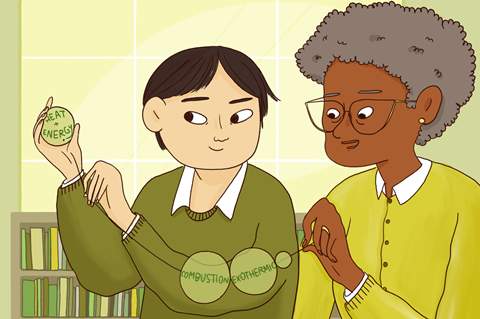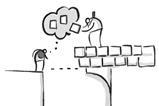Encouraging students to ask questions will help them integrate new knowledge with what they’ve already learned
In recent years there has been a significant shift in teachers using research on what works in the classroom to inform their teaching. As a research school (funded by the Education Endowment Foundation, EEF) Durrington High School supports schools to understand and mobilise the best available evidence.
This works best when it involves small tweaks to classroom practice that can make a big difference to student learning. These are far more likely to be sustained and have a lasting impact than significant changes to practice that require time-consuming resources.

One such example of this is ‘elaborative interrogation’. This is the process of prompting students to generate an explanation for an explicitly stated fact. It usually involves an explanatory prompt (from the teacher, peer or self) in the form of a question eg ‘Why does it make sense that …?’, ‘Why is this true …?’, ‘Why is [X] true and not [Y]?’, or just very simply ‘Why?’. This is such an interesting strategy to consider in terms of research mobilisation, because it just requires a small change to something teachers do all day – ask questions.
7 simple rules to boost science teaching
Click to expand and explore the rules
Build on the ideas that pupils bring to lessons
Help pupils direct their own learning
Use models to support understanding
Support pupils to retain and retrieve knowledge
- Pay attention to cognitive load—structure tasks to limit the amount of new information pupils need to process
- Revisit knowledge after a gap to help pupils retain it in their long-term memory
- Provide opportunities for pupils to retrieve the knowledge that they have previously learnt
- Encourage pupils to elaborate on what they have learnt
Use practical work purposefully and as part of a learning sequence
Develop scientific vocabulary and support pupils to read and write about science
Use structured feedback to move on pupils’ thinking
The evidence suggests that elaborative interrogation works because it supports the integration of new information with existing prior knowledge. During elaborative interrogation, learners activate ‘schemas’ – the networks that the brain uses to connect facts. These schemas help to organise new information, and this facilitates later retrieval.
However, organisation alone is not sufficient. Students must also be able to choose from related facts, and know how and when to use this new information. This is where your elaborative questioning of them comes in – it acts as the ‘glue’ that connects new knowledge to what they already knew, making it easier to retrieve in the future.
So what does this look like in the science classroom? When questioning students during a lesson, once they give you the answer that suggests they have the core knowledge, ask them a ‘why’ question to get them to explain this idea further. For example:
Teacher: What is an exothermic reaction?
Student: A reaction that releases energy.
T: Correct. Can you give an example?
S: Yes – combustion.
T: That’s right – what’s a common example of combustion?
S: Burning a candle.
T: Yes, what’s the chemical reaction involved?
S: The wax reacts with oxygen to produce carbon dioxide and water. Heat and light energy are released.
So in this example, the student is being encouraged to connect their new knowledge of exothermic reactions to what they already know about combustion reactions.
Students can also be encouraged to initiate elaboration themselves. Give them a list of key words/ideas that have been studied in a topic. You can then ask them to do two things with this list: (a) question themselves about how these ideas work and why, and write this down; (b) explain how these ideas link together. This is also useful as it allows you to identify any misconceptions and then intervene accordingly.
The great thing about elaborative interrogation is that from a teacher’s point of view it is a low effort, high impact strategy. It takes very little planning on the teacher’s part, other than thinking about the elaborative questions you will ask, but the evidence suggests it will have a significant impact on the long-term retention of knowledge. A perfect combination!
This article is part of the series 7 simple rules for science teaching, developed in response to the EEF’s Improving secondary science guidance. It supports rule 4d, Encourage pupils to elaborate on what they have learned.
Further reading
- Learn how to study using… elaboration from the Learning Scientists
- J Dunlosky, K Rawson et al, Psychological science in the public interest, 2013, DOI: 10.1177/1529100612453266
- M A McDaniel and C M Donnelly, Journal of Educational Psychology, 1996, 88(3), 508 (DOI: 10.1037/0022-0663.88.3.508)
Downloads
Using revision maps
Word, Size 75.07 kbUsing revision maps
PDF, Size 47.58 kb













No comments yet